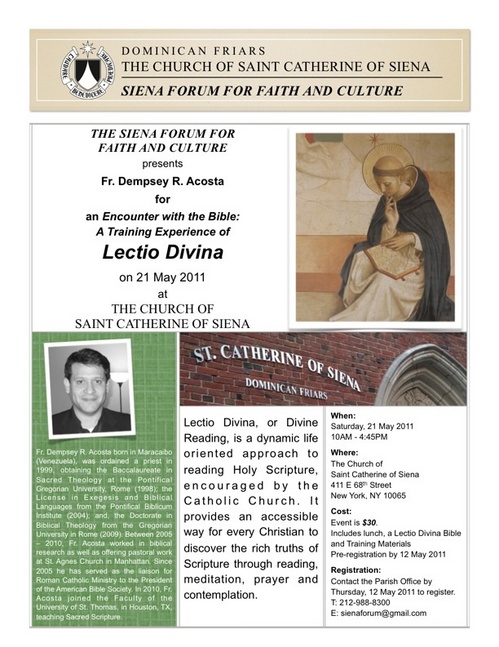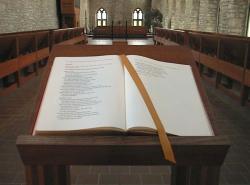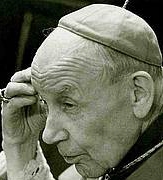Tag: scripture
Scripture is to fill us head to toe
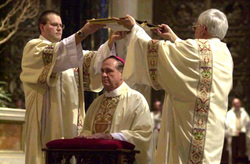 At a priest’s ordination as bishop the Book of the
At a priest’s ordination as bishop the Book of the
Gospels is held open over the man’s head by two deacons, a way to communicate that the
Scriptures are crucial to the life of the bishop and that Christ has infused
His Word in his heart and mind. Archbishop Timothy Broglio said this when he
ordained Bishop Spencer in 2010:
writings inspired by Almighty God and identified and transmitted over the
centuries by His Church must fill you from head to toe. You must be imbued with that word so
that whatever comes from your mouth will be an expression of what you have read
and heard. You will have a special
opportunity to deepen the faith of those to whom you are sent.” We are to be
similarly filled.
The Word of God is everything: hearing what the WORD has to say
I am reading Verbum Domini with great eagerness. I am talking my reading seriously and trying to ponder what the Pope has given us as a path to Christ and to live as an authentic Christian today. Let’s recall the extraordinary address of Pope Benedict XVI on October 6, 2008 where he said:
“the Word of God is the foundation of everything, it is the true reality. And to be realistic, we must rely upon this reality. We must change our idea that matter, solid things, things we can touch, are the more solid, the more certain reality. At the end of the Sermon on the Mount the Lord speaks to us about the two possible foundations for building the house of one’s life: sand and rock. The one who builds on sand builds only on visible and tangible things, on success, on career, on money. Apparently these are the true realities. But all this one day will pass away. We can see this now with the fall of large banks: this money disappears, it is nothing. And thus all things, which seem to be the true realities we can count on, are only realities of a secondary order. The one who builds his life on these realities, on matter, on success, on appearances, builds upon sand. Only the Word of God is the foundation of all reality, it is as stable as the heavens and more than the heavens, it is reality. Therefore, we must change our concept of realism. The realist is the one who recognizes the Word of God, in this apparently weak reality, as the foundation of all things. Realist is the one who builds his life on this foundation, which is permanent.”
Scott W. Hahn, Covenant and Communion (2009), p. 22.
In another place we read:
You cannot put revelation in your pocket like a book you carry around with you. It is a living reality that requires a living person as the locus of its presence.
That is, the believer becomes real insofar as he becomes the Word by hearing such that he does it. That seems to be the only reality that perdures. Revelation is an act in which God shows Himself. Faith is a corresponding act of hearing and doing the Word heard. Outside of that, everything else perishes into nothingness.
J. Ratzinger, God Word: Scripture – Tradtion – Office, Ignatius (2008): 52.
Saints in Verbum Domini
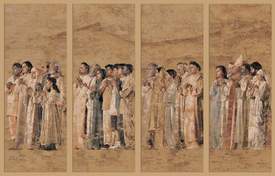 You may be curious to know the saints and blessed Pope Benedict references in Verbum Domini, or whose work he used.
You may be curious to know the saints and blessed Pope Benedict references in Verbum Domini, or whose work he used.
The Pope said, “The interpretation of sacred Scripture would remain incomplete were it not to include listening to those who have truly lived the word of God: namely, the saints” (48).
And, “No sooner do I glance at the Gospel, but immediately I breathe in the fragrance of the life of Jesus and I know where to run. Every saint is like a ray of light streaming forth from the word of God…” (49).
Who are the saints in Verbum Domini?
Saint Peter
Saint John the Evangelist
Saint Paul
Saint Bernard of Clairvaux
Saint Bonaventure
Saint Thomas Aquinas
Saint John of the Cross
Saint Irenaeus of Lyons
Saint John Chysostom
Saint Maximus the Confessor
Saint Jerome
Saint Gregory the Great
Saint Ambrose
Saint Augustine
Saint Anthony, Abbot
Saint Basil the Great
Saint Benedict
Saint Athanasius
Saint Francis of Assisi
Saint Clare of Assisi
Saint Dominic
Saint Teresa of Avila
Saint Thérèse of the Child Jesus
Saint Ignatius of Loyola
Saint John Bosco
Saint John Mary Vianney
Saint Pius of Pietrelcina
Saint Josemaría Escrivá
Saint Teresa Benedicta of the Cross
Saint Gaetano Errico
Saint Maria Bernarda Bütler
Saint Alphonsa of the Immaculate Conception
Saint Narcisa de Jesús Martillo Morán
Saint Ignatius of Antioch
Saint Elizabeth
Blessed Jordan of Saxony
Blessed Teresa of Calcutta
Blessed Aloysius Stepinac
Blessed John XXIII
“Read the divine Scriptures frequently; indeed, the sacred book should never be out of your hands. Learn there what you must teach.”
Apostolic Exhortation “Verbum Domini”
The Pope released his post-synodal Apostolic Exhortation, Verbum Domini, following the 2008 Synod of Bishops on the Word of God. It’s available in eight languages in at least 200 pages.
Verbum Domini – English
Verbum Domini – Italiano
Verbum Domini – Español
The press conference:
At midday today
in the Holy See Press Office, the presentation took place of the Post-Synodal
Apostolic Exhortation “Verbum Domini” of Benedict XVI, on the Word of
God in the life and mission of the Church.
Today’s press conference was
presented by Cardinal Marc Ouellet P.S.S., prefect of the Congregation for
Bishops; Archbishop Gianfranco Ravasi, president of the Pontifical Council for
Culture, and Archbishop Nikola Eterovic and Msgr. Fortunato Frizza,
respectively secretary general and under secretary of the Synod of Bishops.
The
Apostolic Exhortation, which is dated 30 September, Memorial of St. Jerome, is
the fruit of the Twelfth Ordinary General Assembly of the Synod of Bishops,
which was held in Rome from 5 to 26 October 2008. The document, which has been
published in Latin, Italian, English, French, Spanish, German, Portuguese and
Polish, is made up of an introduction, three parts and a conclusion.
Achbishop
Eterovic explained how in part one, entitled “Verbum Dei”, the Pope
highlights both “the fundamental role of God the Father, source and origin
of the Word”, and “the Trinitarian dimension of revelation”.
Chapter one – “The God Who Speaks” – underscores “God’s will to
open and maintain a dialogue with man, in which God takes the initiative and
reveals Himself in various ways”. It also dwells on “the
Christological aspect of the Word, while at the same time underlining the
pneumatological dimension”. This section of the document also focuses on
the relationship between the Eucharist and Tradition, and on the theme of the
inspiration and truth of the Bible.
“Our Response to the God Who
Speaks” is the title of chapter two of part one. “Man is called to
enter into the Alliance with his God, Who listens to him and responds to his
questions. To God Who speaks, man responds with the faith. The most suitable
prayer is that made using the words which were revealed by God and are
conserved and written in the Bible”, said Archbishop Eterovic.
Chapter
three has as its title “The Interpretation of Sacred Scripture in the
Church”. The secretary general of the Synod of Bishops explained how
“Sacred Scripture should be, as the Dogmatic Constitution ‘Dei Verbum’
says, ‘the soul of sacred theology’. … The biblical hermeneutics of Vatican
Council II must be rediscovered, also in order to avoid a certain dualism
evident in secularised interpretations which could give rise to a
fundamentalist and spiritualist interpretation of Holy Scripture. Correct
interpretation requires complementarity in a literal and spiritual sense, a
harmony between faith and reason”. This chapter also examines relations
between Christians and Jews, noting that they enjoy “a very special
relationship … because they share a large part of the Scriptures”.
Part
two of the document is entitled “Verbum in Ecclesia”. Chapter one –
“The Word of God and the Church” – underlines how it is thanks to the
Word of God and the effect of the Sacraments “that Jesus remains
contemporary to mankind in the life of the Church”, said the archbishop.
“The
Liturgy, Privileged Setting for the Word of God” is the title of chapter
two, in which the focus turns to “the vital link between Sacred Scripture
and the Sacraments, especially the Eucharist”. The importance of the
Lectionary is mentioned, as is that of the proclamation of the Word and the
ministry of reader, with particular emphasis being laid on the preparation of
the homily, a theme of great importance in this Post-Synodal Apostolic
Exhortation.
Chapter three of part two concerns “The Word of God in the
Life of the Church” and highlights “the importance of biblical inspiration
for pastoral activity, the biblical dimension of catechesis, the biblical
formation of Christians, the use of Sacred Scripture in great ecclesial
gahterings, and the Word of God in relation to vocations”. Attention is
also given to “lectio divina and Marian prayer”, said the
archbishop.
Part three of the document published today has as its title
“Verbum Mundo”. It draws attention to “the duty of Christians to
announce the Word of God in the world in which they live and work”.
Chapter one – “The Church’s Mission to Proclaim the Word of God to the
World” – explains how the Church “is oriented towards the
announcement ‘ad gentes’, to people who do not yet know the Word, … but also
to those who have already been baptised … but need new evangelisation in
order to rediscover the Word of God”.
“The Word of God and Commitment
to the World” is the title of chapter two, which recalls how
“Christians are called to serve the Word of God in their most needy
brothers and sisters and, hence, to commit themselves in society for
reconciliation, justice and peace among peoples”.
Chapter three of part
three is dedicated to “The Word of God and Culture”. It expresses the
hope “that the Bible may become better known in schools and universities
and that better use may be made of the social communications media, exploiting
all the modern possibilities of technology. The theme of the inculturation of
Sacred Scripture is also linked to the translation and diffusion of the Bible,
which must be increased”, said Archbishop Eterovic.
“The Word of God
and Inter-religious Dialogue” is the title of chapter four. “Having
established the value and topicality of inter-religious dialogue, ‘Verbum
Domini’ … supplies some important guidelines concerning dialogue between
Christians and Muslims, and with members of other non-Christian religions,
within the framework of a religious liberty which involves not only the freedom
to profess one’s faith in private and in public, but also freedom of
conscience; in other words, of choosing one’s religion”.
In the
conclusion, Archbishop Eterovic concluded his explanations, the Holy Father
reiterates his exhortation to all Christians “to become increasingly
familiar with Sacred Scripture”.
Catholics don’t celebrate Jewish holy days, why?
Not long ago a friend asked me why Catholics don’t celebrate
the Jewish holy days. Good question.
A response to the question as to why we
don’t celebrate the Jewish holy days would be along these lines: the Paschal
Triduum is the Christian Passover, the true Pasch. Even the Greek and Latin
name for Easter tells us that (as also the derivation of the name for Easter in
Spanish, French, Italian from the same root).
In one sense, Jesus’ teaching was
in continuity with Judaism (Mt 5.17: “Think not that I have come to abolish
the Law”); but he also in Matthew 5 puts himself forward as a higher Lawgiver
than Moses (“you have heard it said, but I tell you…”). I suggest
reading Rabbi Jacob Neusner’s book, A Rabbi Talks with Jesus, which makes this
point very clear. The Pope himself said in Jesus of Nazareth that Neusner’s book is
an excellent example of honest and reasoned argument between a believing Jew
and the Jesus of the gospels.
Continue reading Catholics don’t celebrate Jewish holy days, why?
Live the Word of God in Challenging Time: a bible summit
 Exploring the Word of God is an ongoing work for all Christians. Catholics have a good opportunity on June 26 to do some work on last Synod of Bishops on the Word of God. It is a good, necessary and beautiful thing to spend time with God as He’s revealed in sacred Scripture.
Exploring the Word of God is an ongoing work for all Christians. Catholics have a good opportunity on June 26 to do some work on last Synod of Bishops on the Word of God. It is a good, necessary and beautiful thing to spend time with God as He’s revealed in sacred Scripture.
Scripture is the audible sacrament
Just returning from Rome where I spent 8 days making a personal retreat of sorts that included time in prayer with the monks at Sant’Anselmo, I could not divorce the experience of hearing the Word of God proclaimed frequently throughout the day. Truly, it was a renewing experience of keeping God in front of me. And how else does one live as a follower of Christ but to keep His word and sacrament in front of the self?
Being deeply transformed by the Word of God: more on Lectio Divina
Renewed interest in lectio divina has given many people the opportunity to know Christ better. Our attention to this timeless prayer of the heart has been captured in a variety of publications such as by Trappist Father Michael Casey, Trappist Father Charles Dumont, Benedictine Archbishop Mariano Magrassi, Catholic biblical scholars Stephen Binz and Scott Hahn, to name just a few. In the last 2 years the archbishop of Toronto, Thomas Collins, has done the yeoman’s work in getting his flock to dig deeply in the Word.
100 years of the Pontifical Biblical Institute, Rome
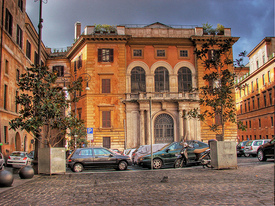 Here’s Benedict XVI’s October 26, 2009 address to the professors,
Here’s Benedict XVI’s October 26, 2009 address to the professors,
students and staff of the Pontifical Biblical Institute, on the centenary of
its foundation. Carefully note the key points the Pope raises for the authentic study of Scripture as Catholics!
Jesus, Illustrious Rector, Illustrious Professors and Beloved Students of the Pontifical
Biblical Institute
100th anniversary of the foundation of your Institute, desired by my holy predecessor
Pius X, in order to establish in the city of Rome a center of specialized
studies on sacred Scripture and related disciplines.
Cardinal Zenon Grocholewski, whom I thank for the courteous words he addressed
to me on your behalf. I likewise greet the superior-general, Father Adolfo
Nicolás Pachón, and I am happy to take the opportunity given to me to express
my sincere gratitude to the Society of Jesus, which, not without notable
effort, deploys financial investments and human resources in the management of
the faculty of the Ancient East, the Biblical faculty here in Rome, and the
headquarters of the Institute in Jerusalem.
who have consecrated their life to study and inquiry in constant listening to
the Word of God. I greet and thank the staff, employees and workers for their
appreciated collaboration, as also the benefactors who have made available and
continue to make available the necessary resources for maintaining the
structures and activities of the Pontifical Biblical Institute. I greet the
former students united spiritually to us at this moment, and I greet you
especially, beloved students, who come from every part of the world.
hundred years have gone by since the birth of the Pontifical Biblical
Institute. In the course of this century, it has certainly increased interest
in the Bible and, thanks to Vatican Council II, especially the dogmatic
constitution Dei Verbum — of whose elaboration I was a direct
witness, participating as theologian in the discussions that preceded its
approval — there is much greater awareness of the importance of the Word of
God in the life and mission of the Church.
communities a genuine spiritual and pastoral renewal, which above all has
affected preaching, catechesis, the study of theology and ecumenical dialogue.
Your Pontifical Institute has made its own significant contribution to this
renewal with scientific biblical research, the teaching of biblical disciplines
and the publication of qualified studies and specialized journals. In the
course of the decades several generations of illustrious professors have
succeeded one another — I would like to remember, among others, Cardinal Bea
— who formed more
biblical groups, as also many experts now present in an array of ecclesiastical
services, in every region of the world.
of yours that is dedicated to interpreting the biblical texts in the spirit in
which they were written (cfr Dei Verbum, 12), and that opens to dialogue with
the other disciplines, and with many cultures and religions. Although it has
known moments of difficulty, it has continued in constant fidelity to the
magisterium according to the objectives themselves of your institute, which
arose in fact “ut in Urbe Roma altiorum studiorum ad Libros sacros
pertinentium habeatur centrum, quod efficaciore, quo liceat, modo doctrinam
biblicam et studia omnia eidem adiuncta, sensu Ecclesiae catholicae
promoveat” (Pius PP. X, Litt. Ap. Vinea electa (May 7, 1909): AAS 1
(1909), 447-448).
at the same time a point of reference. Enriched by the experience of the past,
continue on your way with renewed determination, aware of the service to the
Church required of you, to bring the Bible closer to the life of the People of
God, so that it will be able to address in an adequate way the unheard of
challenges that modern times pose to the new evangelization. It is the common
desire that sacred Scripture become in this secularized world, not only the
soul of theology, but also the source of spirituality and vigor of the faith of
all believers in Christ.
therefore, growing as a high quality ecclesial center of study in the realm of
biblical research, making use of modern methodologies and in collaboration with
specialists in dogmatic theology and in other theological areas; may it ensure
a careful formation in sacred Scripture to future priests so that, making use
of the biblical languages and of the various exegetical methodologies, they
will be able to have direct access to biblical texts. In this regard, the
already mentioned dogmatic constitution Dei Verbum has stressed the legitimacy
and necessity of the historical-critical method, reducing it to three essential
elements: attention to literary genres; study of the historical context;
examination of what is usually called Sitz im Leben. The conciliar document
maintains firm at the same time the theological character of exegesis,
indicating the strong points of the theological method in the interpretation of
the text. This is so because the foundation on which theological understanding
of the Bible rests is the unity of Scripture, and this assumption corresponds,
as methodological way, to the analogy of the faith, that is, to the
understanding of the individual texts from the whole.
further methodological indication. Scripture being only one thing starting from
the one People of God, which has been its bearer throughout history,
consequently to read Scripture as a unit means to read it from the Church as
from its vital place, and to regard the faith of the Church as the real key to
interpretation. If exegesis also wishes to be theology, it must acknowledge
that the faith of the Church is that form of “sim-patia” without
which the Bible remains as a sealed book: Tradition does not close access to
Scripture, but rather opens it; on the other hand, the decisive word in the
interpretation of Scripture corresponds to the Church, in her institutional
organizations. It is the Church, in fact, which has been entrusted with the
task of interpreting authentically the Word of God written and transmitted,
exercising her authority in the name of Jesus Christ (cfr Dei Verbum, 10).
brothers and sisters, while thanking you for your pleasant visit, I encourage
you to continue your ecclesial service, in constant adherence to the
magisterium of the Church and assure each one of you the support of prayer,
imparting to you from my heart, as pledge of divine favors, the apostolic
blessing.
